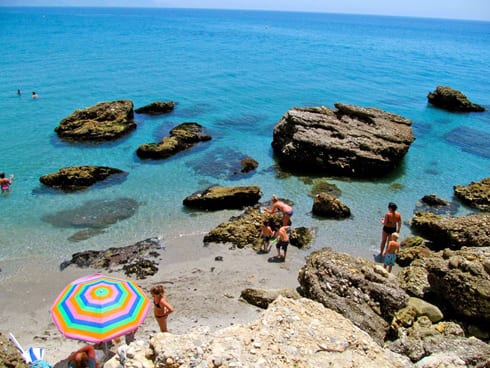FOR those of us who live in a city which could be regarded as a tourist destination, foreign tourists stand out like a sore thumb.
With their huge backpacks and their constant photography, it isn’t hard to spot the difference between a group of tourists excitedly visiting your city’s landmarks and locals on their lunch hour, quietly walking past them.
This isn’t to say that there’s a stigma attached to being a tourist, the way that those who aren’t local seem to stand out is just a fact of international tourism. The only real downside of this is that if it’s obvious that you are not a native of the country you are visiting, you could find it considerably harder to have the kind of ‘genuine cultural experiences’ which are so popular nowadays. Modern travellers generally want to see sights far off the usual tourist paths and engage fully with local cultures.
One of the best ways to avoid being immediately pigeon-holed as a tourist or an expat is to read up on the country you are visiting’s etiquette. Locals will react to you better, other tourists will learn by your example and you will get the chance to really live life in the shoes of another people for the duration of your stay.
Spain is a country with many such traditions and etiquettes, so here we look at some of the biggest mistakes foreigners make when visiting Spain, how they can avoid them and why they are mistakes to begin with.
1. Spanish dining
Spain is well known for its unusual eating habits. What is unusual here though isn’t what is eaten but when it’s eaten. Breakfast is eaten at the usual time, between 7 and 10, but breakfasts are often small and rich, sometimes consisting of hot chocolate and churros or maybe even just a milky coffee.
The next meal, lunch (or la comida), doesn’t come for a very long time after breakfast, sometimes as late as four o’clock in the afternoon, although it is more common to eat between half one and three. It is this period which tends to betray foreign tourists and expats. Nothing is more of a give-away of your foreigner status than turning up at a restaurant at midday clutching a rumbling stomach. Lunch is typically the biggest meal of the day for Spaniards, something most other cultures are not used to. This has the entertaining side effect of making the uninitiated incredibly sleepy. A large hot lunch is usually reserved for lazy Sunday afternoons, especially in Britain.
If you can stay awake long enough, dinner is typically taken between nine o’clock in the evening and midnight and consists of light fare like omelettes, salads or fish. Turning up at a restaurant any time before seven PM is likely to earn you some very strange looks and some uninspired lunchtime leftovers.
2. Tú versus Usted
Attempting to speak the language during your tenure in Spain is a fantastic idea. It really lets people know that you are trying to be courteous and engage with the Spanish culture. One thing to watch out for however is your use of Tú and Usted. Both of these words mean you, but they have very different connotations. Tú is generally used when talking to someone with whom you are friendly with, think family members, friends and acquaintances or, if you are so inclined, pets. Usted is reserved for times when you are talking to someone whom you wish to show respect, or someone that you don’t know particularly well. Examples would be a person significantly older than yourself, someone with authority over you (like the Guardia Civil) or your employer.
It isn’t the end of the world if you forget this rule, people will be impressed that you are making the effort regardless, but this is an easy way to get bonus points.
3. Watch what you wear
This is a pretty simple one and something which you wouldn’t do in your home country anyway, but ensure that you don’t wear your swimsuit out on the street and especially don’t wear it into shops. Some councils are even banning skimpy bikinis, with the president of the group Family Beaches, formed in 2007, stating that “as things stand at the moment, children are having to see things they are yet to be taught by their families”. This may seem like an extreme reaction, but if you want to fit in it is best to try and be at least slightly modest, more so in rural areas of Spain.
4. Take a break from shopping
Out of main towns and cities, it is not uncommon for shops to shut between two and five in the afternoon while the shopkeeper eats their main meal of the day and maybe even catches up on some rest. This is perfectly normal and knocking on the window of said shop to attract the attention of those inside would be considered incredibly rude. If the sign says closed, just come back another time.
5. If you learn one phrase in Spanish, make it this one…
Repeat after me and commit it to memory, “¿habla usted Inglés?” This means “do you speak English?”
It might sound trivial, but asking someone if they speak English, in English, is usually considered a sign of laziness and cultural ignorance. It is especially infuriating for those who actually don’t speak English, as they may not even understand the request, causing embarrassment and confusion. How would you like it if someone started bombarding you with questions in a language you don’t understand, especially if you were in your native country?
Also, note the use of usted instead of tú in the example above. As you probably don’t know the person you are approaching, it is necessary to use the formal you so as to not come off as brash or cocky. For more help with the language, see this guide.
6. In Spain for the long term? Sort your finances out
It can be boring, but there are numerous things to consider if you are moving to Spain for the long term, especially if you are seeking employment in the country. If you aren’t an EU citizen then it is important to apply for a visa through your local Spanish embassy. This will need to be backed up by a number of important documents including a sponsorship letter from your new Spanish employer.
It is also important to consider your tax responsibilities are taken care of. Spain offers a special flat tax rate to expats, set at 24%. To benefit from this you must apply within the first 6 months of arriving in Spain. There are also other things to consider such as your healthcare coverage (although there is a public system in place) and education for your children. Which Offshore wrote a great guide about the administrative intricacies of setting up a life in Spain which can be found by following the link above.
7. Change your tipping habits
Although tipping isn’t particularly common among the Spanish, especially at low-end venues, it isn’t uncommon either. Because of this, tourists should try to tip as much as possible. Most people are well aware that in America tipping is customary and will find it a bit rude if you stop your tipping habit when visiting another country. These assumptions will extend to English speakers in general, so even if you’re not a regular tipper back in Australia, make the effort.
If you do decide to tip, remember to be generous. Unlike in the States, where a 50 cent tip from every customer adds up over the course of the day to a considerable amount of money, in Spain it wouldn’t be uncommon to go a whole day without receiving a tip. This means that if you really want to show your appreciation, anything less than a couple of euros simply won’t cut it.
8. Smoking in public
At the start of 2011, Spain adapted their policy on smoking in public from their former position which allowed bars and restaurants to choose whether to ban smoking or not, only requiring the largest cafés and restaurants to provide non-smoking areas. Now the laws have changed and smoking in public areas is strictly prohibited. Interestingly, it is also illegal to smoke near hospitals and schools, as well as to appear on a public television broadcast while smoking. Spain used to have one of the highest concentrations of smokers in Europe, so this was a pretty alarming change for many.
To stay on the right side of the law remember not to light up after your meal, and try to limit your smoking to uncrowded outdoor areas. Even if you aren’t breaking the law, most people don’t appreciate having smoke blown in their face whilst walking down a busy high street.
9. Grab yourself a bargain
As in the rest of the world, haggling or bargaining is very uncommon in shops. However, when it comes to market stalls and street traders, negotiating a good bargain is half the fun. Despite this, it is important to remember that once you have established the lowest price a vendor will sink to either pay up, or walk away. Street vendors and market traders are there to make a living and continuing to badger them about prices once they have already told you their lowest price is considered rude and insulting.
10. Get used to Spanish drivers
Some would say that Spanish motorists have a tendency to be reasonably forceful, which can be intimidating for a newcomer. Try and stay out of the fast lane unless you intend on going over the speed limit or be prepared to be bumper to bumper with a frustrated Spanish driver who might even blow their horn and flash their lights.
There are also a few driving laws which you may not be used to in your home country, including the mandatory requirement for seatbelts, the ban on listening to in-ear music devices and the need to restrain all pets.












Id say most of that is exactly what does make you a tourist haha
Somebody gave the ‘intern’ an article to write.
This is more suited to the 1980’s rather than 2013.
The world has moved on from this. Unfortunately Spain has not found this out yet and wonders why is cannot keep up.
Don’t quite get your point, Michael. Tips on how to actually blend into a foreign culture are, in my opinion, pretty much timeless.
And what exactly has the world moved on from? Considering Spain remains one of the top European holiday and expat destinations, I’d say it is keeping up just fine, in spite of economical crisis.
Really liked this!
#2 No. That was the first thing I did when I got here for the long term and they said to only use Usted when talking to judge if you are on trial. No one in my region ever uses it….maybe Murcia is the outlier but I have a feeling most of Spain is pretty laid back.
#3 Same thing. Spain is super laid back, especially on the coast. I’m never shocked to see old spanish men walking around with no shirt and going into restaurants like that, but then again, I live in a tourist town on the coast where things are more laid back and Southern Spaniards are more laid back as I’ve seen so far.
Never hurts to respect local customs. You are not there to impose your culture or language, otherwise why bother to travel?
I’d change rule #5 to read: “Por favor, habla Inglés”. It’s always polite to say please before asking someone to speak your language in their country!
And, if you are going to be a tourist in a busy city, then practice up on: “Disculpe me” as, like most tourists you’ll probably be stopping, gawking, and generally getting in people’s way.
There’s a difference between an obvious tourist getting stuck and an expat. We’re known as ‘The Por Favors’. Watching what we say. Treading on eggshells. ‘¿habla inglés?’ is fine ‘Dos Cervezas’ is all you need. When eating out, tip 5%. Get out of people’s way if they flash behind you in their car, don’t have a fit. They want to come through (and watch as they indicate to come back in). No road rage needed. That’s why I love it here. It’s a macho country with no unnecessary bullsh*t. Take it or leave! Viva España!
And I always try to look exactly like a tourist when im abroad. It opens doors, places of interest, cultural experiences that are usually closed to ‘locals’. Mistakes are forgiven (maybe a few words of annoyance) and quite frankly you can get away with more…
Maybe because im English – say ‘sorry’ lots and walk on through. (taking pictures while you go).
PS. Obviously don’t go to danergous places, act a nob, etc, etc…
This was quite a bad article. Going point by point…
1. OK but you forgot to mention “Almuerzo” which is relatively popular and fills the gap between morning coffee and lunch. Not many Spaniards run on empty until 3 in the afternoon.
2. You’re about 50 years out of date with this. Only use the polite forms when addressing someone you want a favor from or need to bribe (several locals have told me this!). Some older folk may be impressed if you refer to them in 3rd, but that’s as far as it goes. Basically, don’t bother with it until you really know what you’re doing.
3. This varies a lot by area so you state the obvious. OK, but mention that in some places, local police may fine you for not covering up when on the street.
4. Well done, you got this right. Though I don’t know of anyone who hammers on the door on a shut shop these days. Are you sure you didn’t get these from a 1960’s Spanish travel guide book?
5. “¿hablas Inglés?” is sufficient. Get with modern day Spain, not 1960’s Spain…
6. OK.
7. Utter rubbish. Tipping as you suggest here screams “stupid foreigner” to most locals. Do as the locals do i.e. maybe round up. duh.
8. OK apart from the last sentence as Spaniards do this a lot. Especially when shopping. Of course it’s still rude though.
9. The only people you tend to bargain with are tradesman (who will tell you that you won’t get a receipt) or the top manta guys (illegal street merchants usually selling counterfeit bags, sunglasses etc.). Do not bargain in markets unless it’s a tat market full of junk.
10. You got this right too!
2.5/10
Must try harder.
surely only tip if its deserved ,i would not if the service was bad, yes try the langauge but be prepared to be misunderstood anyhow , lots of the spanish will be happy to speak german in the balearics but not so much english funny that .
IF ANYONE LEFT A 50 CENT TIP IN THE U S A ESPECIALLY IN NEW YORK CITY OR CHICAGO ETC. THEY MIGHT GET A BEATING. WE LEAVE AT LEAST A 20% TIP IN RESTAURANTS. HARRY FROM NYC
Why Harry? Are you scared of waiters? Time to take up a martial art mate.
Harry
I have understood, that in the USA the income of waiters come mainly from tips, In Spain they have their salary. Although because the actual economic crisis is likely that it have been significantly reduced.
you should not feel forced to tipping is optional.
help and advice would be most helpful.
Am seriously considering relocating to Spain,somewhere like Arboloas in the south- inland from Mojacar,are you able to put me in touch with any expats living there who would be kind enough to offer sound advice.I would like to here from anyone who has the time.
Geoff Dodd
Harry, on another thread you were telling me that NYC is such a peaceuful, non-violent place, and here you are now telling us that waiters get beaten up. Make your mind up lol.
#7 50 cent tip in the US?! More like 18-20% or you’ll get a nasty reaction.
Tipping in Spain is where you might leave max 50 cents for a meal, a nice restaurant 1-3 euros.
In America it is customary to tip by percentage. We minimum 20% for good service.
I disagree with most of the points made here. The addressing by USTED (among Spanish Andalucians)is NON existant. Everybody addresses everybody by TU which in my book is very disrespectful, but a reality in southern Spain nontheless. Andalucians do not know the word “I’m sorry” they are too proud, false pride, to ever admit guilt. It is totally ok NOT to tip, as with the rest of Western Europe, tips are included in the price of the meal. Only tip when you had exceptional service and good food and even then, 10% is more than enough and will be very appreciated by the server. Finally English is the universal language and if you don’t get served English, then move on to the next establishment that will. There are lots of places, mostly foreign owned, that will make you feel right at home by speaking to you in your language. In the end it is your hard earned money you’re spending. Last but not least, Andalusians are the first ones to light up where it is forbidden. In the end do not forget that any personal interaction is a two way street and people have no right to get offended whatsoever if you address them in English, especially if you’re a tourist. And as for the rest, as the saying goes: When in Rome do as the Romans.
Good info, thanks. But please, can you clean up the writing style – the grammar’s poor too
This article is rubbish, I was expecting to see some flaws here but you can easily see that this has not been written by an original Spaniard, first of you will never hear usted unless from southamerican immigrants. The dress code on swimwear is totally fake, u can pretty much go naked around, at my artschool i was assisting naked with a bathrobe, and it is true that laws in Spain are very blurry, no one cares bout speed habits and such… Also be ready to be stared and critiziced everywhere, i hate how spain has this little village feeling on it of gossiping always infront of you while staring… Also ull find a lot of rude people, some say its just the culture, for example in my city it is not normal to say thank you or please
This article has obviously written by a U K person. And for an English person to suggest that Americans leave 50 cent tips anywhere is outrageous. The worst tippers in the world are the “Brits” . Whether they are in Spain or the USA . The vast majority of Americans leave a minimum tip of 15 % and most leave 20 %.
Old article, could have been written by an American or an Irish person too. Whatever, it’s rubbish. In any case, why should a tourist on a 2week holiday have to go native.
1) Nobody uses “usted” and 2) I go topless at my local swimming pool and no one looks twice.
I visited Spain last year with a friend. We smoked outside cafes. We only gave about 3euros tip for the waiter’s /waitresses they were grateful. We made many friend I’m due to go back next month with my son and cannot wait I’m also moving there in 2years